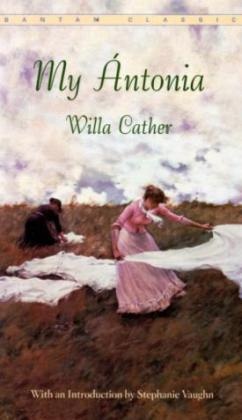Ulteriori informazioni
Zusatztext "No romantic novel ever written in America! by man or woman! is one half so beautiful as My Antonia ."—H.L. Mencken Informationen zum Autor Wila Cather was probably born in Virginia in 1873, although her parents did not register the date, and it is probably incorrectly given on her tombstone. Because she is so famous for her Nebraska novels, many people assume she was born there, but Wila Cather was about nine years old when her family moved to a small Nebraska frontier town called Red Cloud that was populated by immigrant Swedes, Bohemians, Germans, Poles, Czechs, and Russians. The oldest of seven children, she was educated at home, studied with a Latin neighbor, and read the English classics in the evening. By the time she went to the University of Nebraska in 1891–where she began by wearing boy’s clothes and cut her hair close to her head–she had decided to be a writer. After graduation she worked for a Lincoln, Nebraska, newspaper, then moved to Pittsburgh and finally to New York City. There she joined McClure’s magazine, a popular muckraking periodical that encouraged the writing of new young authors. After meeting the author Sarah Orne Jewett, she decided to quit journalism and devote herself full time to fiction. Her first novel , Alexander’s Bridge , appeared in serial form in McClure’s in 1912. But her place in American literature was established with her first Nebraska novel, O Pioneers! , published in 1913, which was followed by her most famous pioneer novel, My Antonia , in 1918. In 1922 she won the Pulitzer Prize for one of her lesser-known books. One of Ours. Death Comes for the Archbishop (1927), her masterpiece, and Shadows on the Rock (1931) also celebrated the pioneer spirit, but in the Southwest and French Canada. Her other novels include The Song of the Lark (1915), The Professor’s House (1925), My Mortal Enemy (1926), and Lucy Gayheart (1935). Wila Cather died in 1947. Klappentext "The best thing I've done is My Antonia," recalled Willa Cather. "I feel I've made a contribution to American letters with that book." Ántonia Shimerda returns to Black Hawk, Nebraska, to make a fresh start after eloping with a railway conductor following the tragic death of her father. Accustomed to living in a sod house and toiling alongside the men in the fields, she is unprepared for the lecherous reaction her lush sensuality provokes when she moves to the city. Despite betrayal and crushing opposition, Ántonia steadfastly pursues her quest for happiness—a moving struggle that mirrors the quiet drama of the American landscape. Leseprobe Chapter One I first heard of Antonia on what seemed to me an interminable journey across the great midland plain of North America. I was ten years old then; I had lost both my father and mother within a year, and my Virginia relatives were sending me out to my grandparents, who lived in Nebraska. I travelled in the care of a mountain boy, Jake Marpole, one of the "hands" on my father's old farm under the Blue Ridge, who was now going West to work for my grandfather. Jake's experience of the world was not much wider than mine. He had never been in a railway train until the morning when we set out together to try our fortunes in a new world. We went all the way in day-coaches, becoming more sticky and grimy with each stage of the journey. Jake bought everything the newsboys offered him: candy, oranges, brass collar buttons, a watchcharm, and for me a Life of Jesse James, which I remember as one of the most satisfactory books I have ever read. Beyond Chicago we were under the protection of a friendly passenger conductor, who knew all about the country to which we were going and gave us a great deal of advice in exchange for our confidence. He seemed to us an experienced and worldly man who had been almost ...
Relazione
"No romantic novel ever written in America, by man or woman, is one half so beautiful as My Antonia." H.L. Mencken

